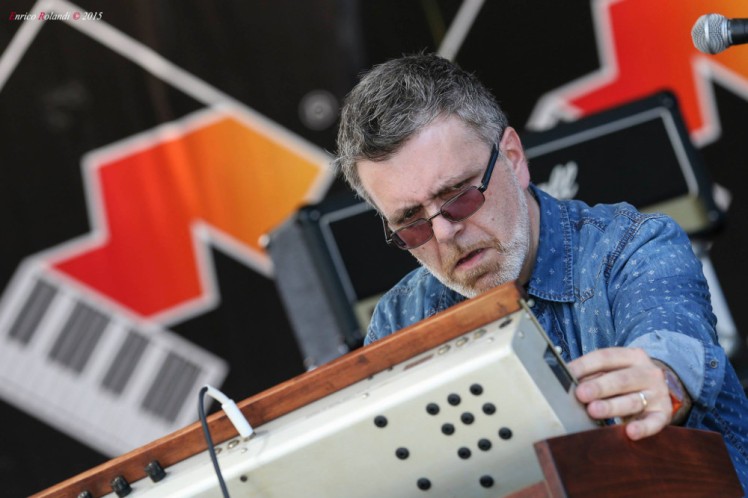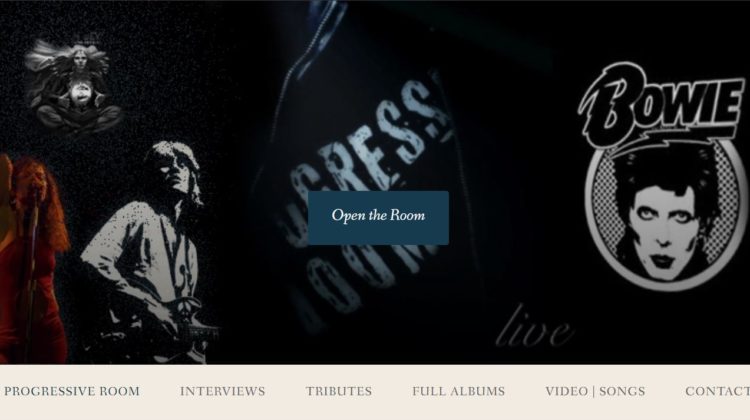Welcome to ‘Progressive Room’. It’s an honor for us, taking an interview from an important Band such as ‘Logos’’. We suppose it’s the first time that you give an interview to a Greek Prog/Rock Channel, so let’s start with a flashback of your career.
- What was the main motivation that made you start learning music and what made you involve to Progressive Rock genre?
LOGOS: Before starting, please let us thank everyone at “Progressive Room”; many thanks for what you do, it is a great work guys! Thanks also to your readers and followers: we hope they would find something interesting in our music and in these words. You were right: this is our first Greek interview. Let’s start.
Each member of Logos has a different musical background, but our favorites are the old Italian progressive rock bands of the seventies, Le Orme and Banco del Mutuo Soccorso and international like King Crimson and Genesis. The main motivation to start learning music was to play and compose this kind of songs, with its style and structures; in our songs you can discover clear echoes of these bands. Progressive Rock has no rules so everything people have in mind can be developed in this genre. This is a great thing in our opinion.
- What does “Music” mean to you, and how do you experience it in your daily routine?
LOGOS: Music is our main hobby but maybe music is our life. Every day we use to listen to different styles of music, not only Progressive Rock, and try to get something new to our songs. So please remember that we are Italian. In Italy we have an incredible musical background that came from the Opera (Verdi, Puccini, Rossini). One of the most important meaning about music, should be related to melody: we try to write new music but remembering our “old” melody school. If you know our songs, you should confirm that melody has a strong key, because we absolutely regret technicality rather than strong musical atmospheres.
- Do you feel satisfied with the music evolution nowadays? How can it be compared to the one of 70’s for example?
LOGOS: 50 years are gone from the 70s. Culture, People and Technology are lot different. In our opinion the key is not to compare the music but people. In the 70s music was different for many reasons: the main was how to get in touch with an artist or a band, a way to music for buying a LP or a ticket for a gig. We were born in the 70s so we can only say what fathers and brothers told us, but they all use to say that buying a LP was a rite: a moment of joy and fear because the music in that box was unknown. Nowadays surfing the Internet everyone can discover thousands of different bands and styles, and listen to everyone’s music: maybe we lost some poetry and pathos.
- Do you see that the musical fixation evolving or being stagnant?
LOGOS: People that love progressive rock use to listen only to 70s titles. It’s not a rule but almost right. We don’t believe the reason is because music evolution becomes stagnant. Progressive milestones were made in those years. So most of the people don’t need to discover new bands, maybe for many reasons: no free time; no one band will create great albums like Genesis or Yes did; many more. We think music today is different, maybe not huge like those days, but good! It’s a rule that we can find in every style: modern Classical Music is good but everyone knows only Mozart or Bach or etcetera. They are giant but not the only that make great Classical Music. The difference with progressive is that no one is talking about a stagnant scene on Classical Music
- Do you separate some new bands with a lot of interesting ideas or orientation?
LOGOS: One of the most important side of playing music is the feeling with other bands. To share stages, musical instruments and equipment, experiences and episodes is a step that start before every show and continue after. In a Progressive Festival in 2014 we met Phoenix Again, another Italian Band from Brescia. We started a narrow collaboration and played several gigs together, touring Italy and The Netherland. They have just released a new album: why not to arrange a show in Greece with both bands?
- Should we be afraid that eventually music has come to an end , and everything new is a repetition of an old one?
LOGOS: We must say that Progressive Rock has almost 50 years… it’s not easy to find something new to say after 50 years of albums and bands. There are some repetitions or some echoes of “this or that song”. We think this is not a bad thing.
50 years gone but different people are playing, so music has not come to an end. To be “absolutely” original means to create another genre. Progressive Rock bind different bands over some rules that everyone can change: to have lot of keyboards or not; to play long suites or not; to be melodic or technical; so on. The only thing to keep in mind is have fun.
- Which bands or artists have most influence your music generally, and how?Please, mention 2 to 3 albums that really blew your mind up.
LOGOS: In the early years, Logos used to play mainly songs of Le Orme and Banco. We must mention “Collage”, “Uomo di Pezza” and “Felona e Sorona” of Le Orme and “Banco del Mutuo Soccorso” with the same album. All these albums are of Italian bands. Le Orme are different from Banco but both have an unbelievable identity.

- How exactly ‘Logos’ came up in 1996? What was the main reason that finalized the common (music, personal) spots for the band?
LOGOS: Logos were formed in 1996 only by three people in a Orme/Nice line-up (bass, drums and keyboards). They played mainly songs of Le Orme, P.F.M and Banco. One year later, when a guitarist came in the band, they started to compose new songs and recorded the first album ‘Logos’ in 1998. They were not only a band that meet, play and go back home… they became friends that meet every day, sharing ideas and music. Those years were different, maybe harder than now. There were no Internet and smartphones with SMS messages or messenger’s apps. Logos’ members had to meet in the rehearsal room or, more frequently, in a pub.
- We’ve notice that you’re a band undertaken to materialize its ideas by yourself. But in the 2nd , and especially the 3rd album you chose some good partners to join you. Should we expect a more outgoing approach in the near future?
LOGOS: We can say that ‘LogoS’ and ‘Asrava’ (the second album, 2001) were written at the same time with the same people. Our partners were friends that helped on live shows or in some recording session. About last record ‘L’enigma della vita’ (2014), it comes thirteen years after ‘Asrava’. This is really a big piece of time. During these years the band had seen lot of line-up changes but a pool of different musical experiences that worked towards the same project and vision. This gave the album an unbelievable display of colors and points of view. This is one of the secrets of ‘L’enigma della vita’: everyone joined Logos for a while gave his hint for a song or only a couple of cords but this was effective for our song writing skills. This way was a good partnership with people that joined the album.
Today Logos’ line-up sees a double keyboard corners with Luca Zerman (main voice, Hammond, Moog, Synths) and Claudio Antolini (Piano, Synths, Taurus Moog), Fabio Gaspari on bass guitar and Alessandro Perbellini on drums. Of course we are working on the next album. We already announced three important partnerships: Fulvio Saiani, photographer and owner of every shots used in the previous album; Marco Zuffo, musician, poet and artist, his poems will be the lyrics of next album; and painter Marica Fasoli, Italian renowned artist, that will develop the cover art.
- So if we had to categorize the band’s genre, should we place you more to the term ‘Symphonic Prog’ or is more than that?
LOGOS: We thing Symphonic Prog is good. We have lot of instrumental parts that fits this kind of music
- Do the lyrics written first and then the music?
LOGOS: We use to start from lyrics. After that we write the music on the lyrical parts and then the whole song.
- Are you all currently there on recordings throughout the process and how do you contribute to the orchestration and the final mix of the songs?
LOGOS: We absolutely make and manage everything. Think to ‘L’enigma della vita’: this album took more than ten year to make and more than six years to record. We recorded the songs carefully and slowly in our recording studio, playing every single step again and again. Then we mixed and mastered it in a professional studio. Our target was to publish a good product, not as faster as we can.
- What affects you and what motivates you to write down new ideas?
LOGOS: For many years we use to play at our concerts original songs plus cover of Le Orme, Banco, Genesis, etc. Now we only play Logos’ music taken from all the three albums. That’s the reason that motivate us to compose new songs: during our shows, we want to play only our music to people. This is a great plus: people can listen to our music in a way more real and direct than a CD or LP or MP3.

- Ok, lets go back in 1999 and your first self-titled album. Four minds, six songs , one story that really showcased a very talented and promising debut album. Strong symphonic leanings and complex compositions as well. Also we hear some impressive changes in style and sound..So atmospheric, melodic..so dark on occasion.. We thought “if they were to delay the release of this album for some months , every time , we’d hear a completely different wok” , is that right?
LOGOS: LogoS is a Greek word and its meaning is full of importance. That time we were playing music for some months composing the songs that would fill the first album. Songs came quite easily and people were happy of the results. We got the name of the band and then played the songs in some festivals and clubs. To make an album was not our main target but lot of people used to ask for it after our shows. Nowadays you can record an album with a smartphone but in 1998 technology was totally different. We recorded the first album in the spring of 1998 by an 8-tracks analog equipment.
It is a live album because we recorded it playing all together and making some overdubs only for voices chorus and some guitar or synth solos. Mastering was terrific, we were not able to use that engines and the final result, as everyone can hear, is really poor. By the way, we still like the album. You can find some good points. Our regret is to leave that kind of music in a low quality audio but we are not planning to re-record it or re-master original tapes these days or in a next future. The cover art was by Luca Zerman inspired by painter Giorgio De Chirico. The two most interesting songs are “Il grande fiume”, a twenty-minute suite whose text is inspired by Herman Hesse’s novel ‘Siddharta’, and ‘Sentiero nel prato, porta dell’universo’, that tells a dream where a child meets an alien.
- And then in 2001 , the story of ‘ASRAVA’’ follows…We said…”that’s pure symphonic prog , the one of the 70’s!” An imaginary variation of sound and play, acoustic guitars, synths, keybord organ..keeps the dark melodic patterns and long last compositions. Tell us about this project please.

LOGOS: When a part of Logos was fighting with technology issues about recording and mixing on the first album, the rest of the band was full on the new material. ‘Asrava’ was made from August 2000 to January 2001. The cover, again a painting by Luca Zerman, showing a desolate and alien landscape with a disturbing dummy in the foreground: it shows that the band has taken a different musical direction than the first album. No more cosmic and dreamy atmospheres created by the keyboards and delicate “floydian” use of the steel guitar, the sounds have become more aggressive, dark, the rhythm is more present and tight. More than the historical prog of the ’70s, the band now seems to be inspired mainly by the heavy sounds of King Crimson’s 90s, such as instrumental “Ezra Pound”.

Even the lyrics became dumber than the previous album. The song “99” talks of a big and silent explosion that has taken away everything and everyone. Interesting is the instrumental piece that gives the title to the album: the ‘Asrava’ in the Buddhist doctrine are the four negative influences that prevent man from reaching illumination; and, of course, the song is divided into four parts. “Terra incognita” is the most direct piece of the album, with a simple and regular rhythm. There are also two delicate acoustic songs: “La leggerezza della libertà” and “Epilogo”, embellished by classical guitars by Fabio Gaspari and Massimo Maoli. Unlike the first album, ‘Asrava’ was recorded in a very accurate way, and in fact it costed the band months of hard work. We think this his is one of the first worldwide self-produced album recorded using a Macintosh laptop.
- …And finally it had to be 2014 to hear your 3rd studio album. What took you so long to release “L’Enigma della Vita” , your best album in our opinion.
LOGOS: It’s a 76 minutes journey across universe, humans, love, loneliness, and wars. It tries to solve the biggest question on our staying in this world: what is the meaning of our life? What is ‘L’enigma della vita’. It takes lot of years to born for many reasons. We wrote and rewrote many times some parts to get the right atmosphere. At the same time our work was not only related to music. We invested a lot of energy to get a strong visual impact! The album cover and all the images that you can find in the booklet perfectly fit, in our opinion, the poetical strength of the lyrics and the evocative power of the music.
- In this album we surprisingly hear a more space/psychedelic hearing. A nice remind of German prog/rock band ELOY, and some ‘King Crimson’ passages here more than your previous works. Worth the waiting for sure. Please explain us the approach for this imaginary project.
LOGOS: In our minds the project was clear in the first days when ‘Asrava’ was released: we would develop some songs that would talk about humans and the most important moments or events in life like birth, death, family, love and loneliness. Songs came in a decade, so the styles changes are due to this but the main project line was always respected. About King Crimson or other major name, we played that music for years so we have a sort of natural sense to create songs that “should” be original LogoS music, but some influences are difficult to leave.
- You talked about Cover art and images. Please explain us this point.
LOGOS: We believe that an important thing is the visual side of every album. Nowadays lot of bands miss this. We strongly believe that music is not only what you’re listening to but what give emotions to your mind and body. When you close your eyes and listen to the record, the music paints many visualisations, and you end up getting lost on each piece. Everyone needs to be able to see music by images that guide people to understand deeper the meaning of the songs.
In this way, we joined collaboration with a great young photographer, Fulvio Saiani that shot ad-hoc images for the songs. This gave, in our opinion, a lot of value to the whole project. We have also released a gatefold double vinyl version of the album. This huge package will let listeners to touch an old-style gatefold and vinyl. In our opinion, this is the meaning of ‘to touch the music’ because digital distribution misses this point at all.
- So what are your plans for the present and near future considering a next album or tour scheduling?
LOGOS: By now we have stopped every live show because we are working on the new album: it will be a concept album related to a topic very close to the painter Marica Fasoli. This topic inspired the band to write some songs that link LogoS’ music and Marica’s art. We hope to announce it next year. For every info about our future, present and past, please visit our website or follow us on any social network.

